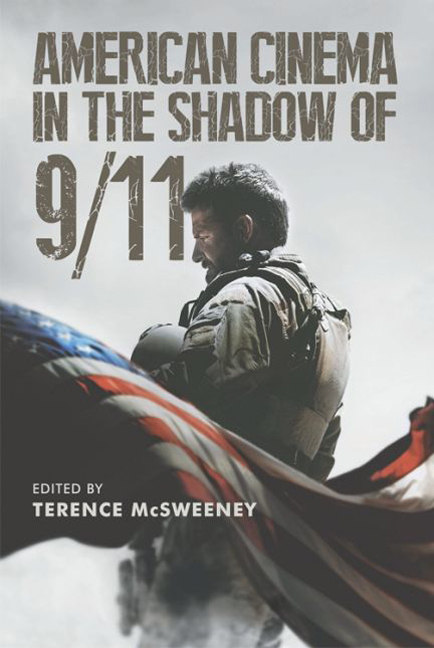Book contents
- Frontmatter
- Contents
- List of Figures
- Acknowledgements
- Foreword
- Introduction: American Cinema in the Shadow of 9/11
- Part I Dramatisations of the ‘War on Terror’
- Part II Influences of the ‘War on Terror’
- 6 ‘Not Now That Strength’: Embodiment and Globalisation in Post-9/11 James Bond
- 7 Training the Body Politic: Networked Masculinity and the ‘War on Terror’ in Hollywood Film
- 8 ‘Gettin' Dirty’: Tarantino's Vengeful Justice, the Marked Viewer and Post-9/11 America
- 9 Stop the Clocks: Lincoln and Post-9/11 Cinema
- 10 Foreshadows of the Fall: Questioning 9/11's Impact on American Attitudes
- Part III Allegories of the ‘War on Terror’
- Selected Filmography
- Notes on the Contributors
- Index
9 - Stop the Clocks: Lincoln and Post-9/11 Cinema
from Part II - Influences of the ‘War on Terror’
Published online by Cambridge University Press: 10 May 2017
- Frontmatter
- Contents
- List of Figures
- Acknowledgements
- Foreword
- Introduction: American Cinema in the Shadow of 9/11
- Part I Dramatisations of the ‘War on Terror’
- Part II Influences of the ‘War on Terror’
- 6 ‘Not Now That Strength’: Embodiment and Globalisation in Post-9/11 James Bond
- 7 Training the Body Politic: Networked Masculinity and the ‘War on Terror’ in Hollywood Film
- 8 ‘Gettin' Dirty’: Tarantino's Vengeful Justice, the Marked Viewer and Post-9/11 America
- 9 Stop the Clocks: Lincoln and Post-9/11 Cinema
- 10 Foreshadows of the Fall: Questioning 9/11's Impact on American Attitudes
- Part III Allegories of the ‘War on Terror’
- Selected Filmography
- Notes on the Contributors
- Index
Summary
If you can look into the seeds of time and say which grain will grow and which will not, speak then to me. Time's a great thickener of things.
Abraham Lincoln to William Seward in Lincoln, quoting from Macbeth (Act I Scene ȝ in the traditional text)INTRODUCTION
Steven Spielberg's Lincoln (2012) is about the relationship of time to history. The film's symbolism, its words, deeds, actions and characters all represent time. And not just any old time, but momentous time; the sort of time that gets documented by historians and talked about by cultural commentators. The sort of time that is meant to be worth remembering and charting; time that has a place in history; not just time that is slouching towards the next event or action and which will be quickly forgotten as the moment recedes, but time that is forever ingrained upon memory and remembrance. The sort of time Hollywood likes very much.
That Spielberg the director might want to document time through history in this manner is no great surprise. His historical movies – Empire of the Sun (1987), Schindler's List (1992), Amistad (1997), Saving Private Ryan (1998), and more recently Bridge of Spies (2015) – all make the viewer constantly aware of time as a marker of some historical substance. The moment things of import happen, the passing of time as momentous signifier, the establishment of monuments as frames of reference; so much in Spielberg's cinematic conscience means something timely. As he makes clear, talking about the background and production of Lincoln, ‘history is always relevant’.1 And by this Spielberg means to suggest, as his career has constantly framed it, that the past always re-embellishes and illuminates the present, offers allegory and metaphor even in its smallest fragmentary moments. In Bridge of Spies, Tom Hanks’ character, the lawyer Jim Donovan, sent to Berlin at the height of the Cold War to negotiate the repatriation of the shotdown U2 pilot Gary Powers, is passing from east to west on an elevated train when he witnesses a night-time shooting of someone attempting to scale the putative Berlin Wall. The scene immediately recalls contemporary apogees of migration and desperate escape to a ‘better’ and ‘free’ west in our own age.
- Type
- Chapter
- Information
- American Cinema in the Shadow of 9/11 , pp. 191 - 206Publisher: Edinburgh University PressPrint publication year: 2017

